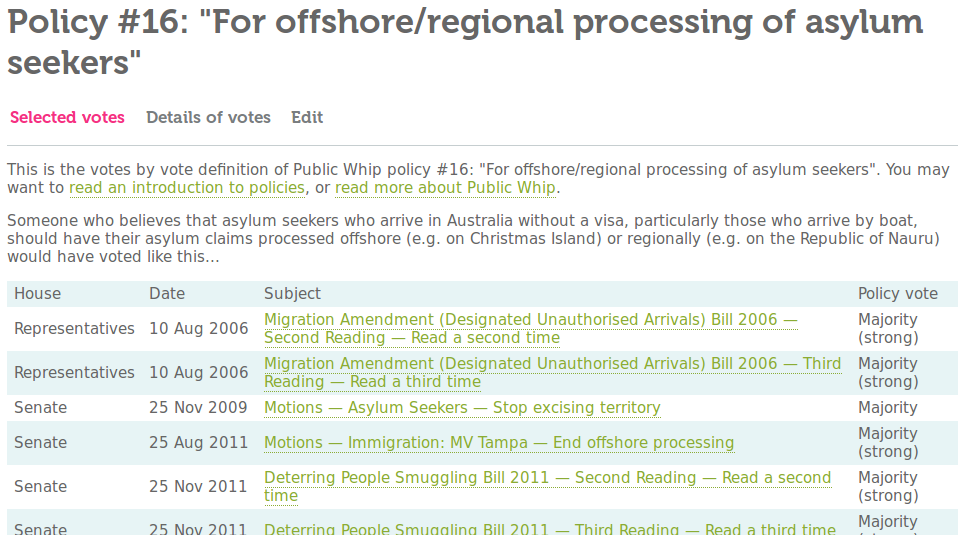This post is part of a series on our parliamentary vote tracker project. Read our previous post to learn more about the concept of policies and policy selection. You can also read our previous posts: a technical update and an introduction to what we’re doing and why.
Co-authored by Natasha Burrows.
Specific wordings of policies have been an issue throughout the process of policy development. The one that springs to mind is our policy relating to asylum seekers. The problem here is exacerbated given the heightened politics surrounding the issue. Narrowing this policy down to something that is objective and can be measured has been quite difficult.
In a draft, the policy was written like this: For “a stronger system for asylum seekers arriving by boat”. This wording was borrowed from the UK Public Whip site. However, this way of phrasing the policy was flawed because both of the two main parties, Labor and the Coalition, broadly agree on the need to implement a “stronger system” with regards to asylum seekers arriving by boat. However in the last session of Parliament, the Coalition often voted against Labor’s measures for a stricter system, specifically in regards to the so-called Malaysia Solution. As a result of the phrasing of our policy, our data suggested that the Coalition was voting against a stricter system for asylum seekers arriving by boat. However in reality the Coalition was really just voting against Labor’s policies for a stricter system for asylum seekers, while at the same time proposing their own strict system.
The language has also been an issue. What exactly does a “strict system” entail? Our reasoning for keeping the language broad (and, admittedly undefined) with a word like strict was because asylum seeker policy for boat arrivals in Australia is quite broad. It comprises of issues relating to visas, mandatory detention and offshore processing. To narrow this down to only one specific component of asylum seeker policy risked making the policy too specific for the legislation that was presented to parliament. However broad language risked presenting issues and policies with a pseudo-political-correctness. In reality, developing a succinct, understandable and objective policy is much harder than we first imagined.
Ultimately, we decided to split the broader policy into four parts: “For greater scrutiny of detention centres”; “For offshore/regional processing of asylum seekers“; “For temporary protection visas“; and “For the Refugees Convention and Refugees Protocol“. So far this phrasing seems to be working.

Because our whole modus operandi is to increase openness in Parliament, it only makes sense for us to open up the processes by which we are doing this. We really do want as much feedback as possible.
